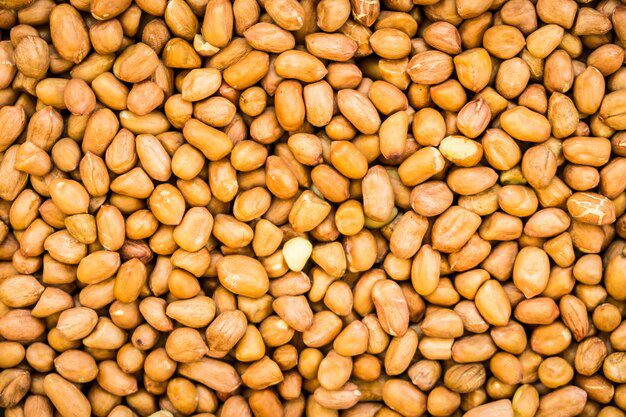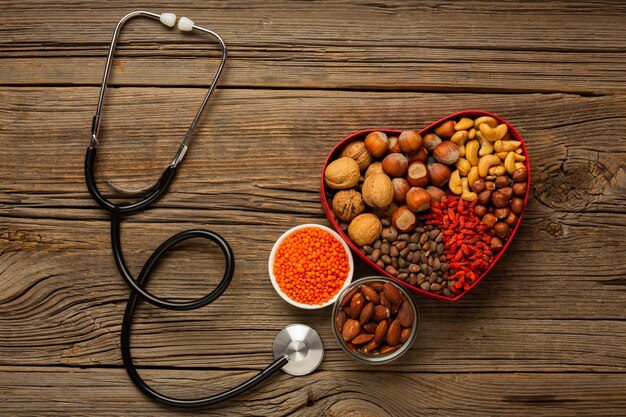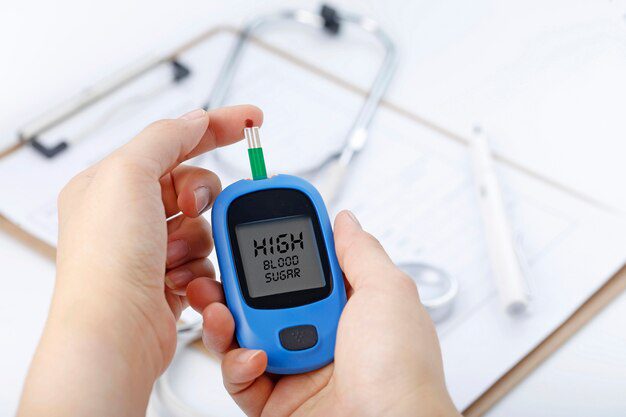This content is for informational and educational purposes only. Always consult a qualified healthcare provider.
Last Updated on February 24, 2024 by Grace Oluchi
Peanuts (Arachis hypogaea) are a legume that originated in South America. They have different names, such as groundnuts, earth nuts, and goobers. All of them provide protein, vitamins, minerals, and antioxidants. There are also other health benefits like promoting satiation and helping fight against heart disease.


Now despite their names, peanuts are not related to tree nuts, but rather belong to the legume family, along with beans, lentils, and peas. In the United States, they are rarely eaten raw, instead, they are mostly eaten when roasted or as peanut butter. However, some other parts of the world do eat it raw, or add it as a topping to snacks like ice cream for example.
There are other foods that contain peanut butter such as:
- desserts
- cakes
- snacks
- sauces
Peanuts are rich in protein, fat, and other various healthy nutrients. Some studies even show that peanuts could aid in weight loss and reduce the risk of heart disease. They’re known for their distinct taste, crunchy texture, and versatility in the kitchen world.
In this article, you’ll get to know everything there is to know concerning them. Let’s begin, shall we…
📋 Table of Contents
Health Benefits Peanuts Can Provide You


Energy Boost
They are a rich source of protein and fiber, which assist in the conversion of carbohydrates into energy. The protein content of it is about 25 to 30 % of its total calories. Both the fiber and protein combination also slows down the digestive process which releases steady energy into the body. This makes them a great snack for when you feel tired.
Promotes Heart Health
Eating peanuts may help protect you against coronary heart disease. A study found that they may be able to lower blood cholesterol levels which lead to plaque development in the blood vessels. It was also shown that it could reduce inflammation that causes heart disease.
Supports Weight Loss
There are multiple mechanisms in peanuts that could possibly aid weight loss. The fiber and protein in them promote the feeling of fullness. Although they are high in calories, some of the fat is resistant to digestion and doesn’t fully get absorbed by the body. Eating them may also result in higher resting energy expenditure, which increases overall calorie burn.
With that being said, adding them to your diet plan for weight loss could help you reach your goals faster.
Protect Against Gall Stones
Gallstones are small particles that form in the gall bladder. Some people are at a higher risk of it, including women, those with a higher weight, and people over the age of 40. However, a study found that eating amounts of nuts, particularly peanuts, lowered the risk of gallstones by 25 %. So this might be good for you to start adding them to your meals. Just one serving can reduce the risk of gallstones. You can even create your own meal plan, and place peanuts in it.
Check out my best tips and hacks for creating your own meal plan
Promotes Bone Health
Peanuts are high in manganese, which helps the body maintain a healthy bone structure, by assisting in the production of enzymes necessary for the growth of strong bones. They’re also high in phosphorus, calcium, and potassium, all of which are important in the formation of bones.
Lowers The Risk Of Cancer
Eating enough amounts of peanuts has been associated with a reduced risk of colorectal cancer. The compound isoflavone in it has anti-cancer properties. A study also found that peanuts can also reduce the risk of postmenopausal breast cancer. They were also found to prevent gastric and esophageal cancers.
Improve Skin And Hair
The monounsaturated fats and vitamins found in peanuts make them beneficial for the skin. They also contain vitamins C and E that help delay visible signs of aging. The resveratrol in them acts as a potent anti-aging compound, which also gives you clear and glowing skin. They’re good sources of B vitamins that convert into biotin only to aid in hair growth. So, eating them just might make you look younger.
You might enjoy reading about these:
15 ways to keep your hair healthy and moisturized.
Hair types: How to know your hair type and care for it.
Helps Fight Depression
They’re a good source of tryptophan, a compound that is important for the production of serotonin. It’s an important brain chemical that plays a role in mood regulation. When you’re depressed, there may be a decrease in the amount of serotonin released from the nerve cells in the brain. However, tryptophan can help change that by increasing its production and leading to a better sense of self.
Boosts Fertility
Folate boosts fertility and peanuts happen to be rich in it. A study found that eating 400 micrograms of folic acid which is present in folate, boosts fertility. It also offers excellent immunity to a newborn baby and reduces the chances of miscarriages significantly more. Folate lowers the risk of abnormality and chances of neural or even psychological conditions greatly.
May Help You Live Longer
Eating peanuts may increase your life span too. Some studies show that regularly eating any type of nuts, can reduce your chances of developing life-threatening illnesses, than those who rarely eat them. However, because the study was observational, it cannot prove that peanuts were the actual reason for lower death rates. But they are linked to the outcome.
May lower blood sugar levels
Adding peanuts to your meals doesn’t actually spike your blood sugar levels. They have a glycemic index score of 14, which is quite low and that’s why they’re considered safe for diabetics. The fiber in them also helps lower blood sugar levels and also contains magnesium and other healthy oils that play a role in this event. You can start your day by eating peanuts, it may help control your blood sugar levels throughout the day. It can also lower your risk of developing type 2 diabetes.
The rich nutritional contents in them such as monounsaturated fat, fiber, arginine, niacin, folate, and vitamin E are responsible for keeping things running just fine.
Other interesting health benefits
- Lower risk of Alzheimer’s disease
- Aids in the growth and development of children
- Rich in biotin
- Contains copper
Keep These Things In Mind Before You Make It A Part Of Your Daily Diet
Peanuts are tasty and healthy, but it’s important that they may affect you in ways that may harm you due to certain events.
Toxin poisoning
Sometimes peanuts can be contaminated with a species of mold that produces a toxin. The main symptoms of poisoning, include loss of appetite and yellow discoloration in the eyes, which are the typical signs of liver problems. Serious poisoning can lead to liver failure and liver cancer. The risks basically depend on how the peanuts are stored, they increase with warm and humid conditions, especially in tropical areas.
But not to worry, it can be prevented by properly drying peanuts after harvesting and keeping temperature and humidity low where you store them.
Allergies
Peanuts are the most common food allergens. Approximately 1% of Americans are believed to be allergic to them. These allergies can be life-threatening and shouldn’t be taken with levity, in fact, they are sometimes considered to be the most severe allergen. People with this allergen should make sure they avoid all peanuts and peanut products.
Anti-nutrients
They contain an amount of anti-nutrients, which are substances that can interfere with your body’s ability to absorb nutrients and reduce nutritional value in the body. One of the noteworthy anti-nutrients in them is phytic acid. It’s found in all edible seeds like nuts, legumes, and grains. It ranges from 1-5 % in peanuts and reduces the availability of iron and zinc in peanuts, lowering their nutritional value slightly.
However, this isn’t necessarily a cause for concern in well-balanced diets and among those who regard eating meat. Nonetheless, it may be a problem in countries, where main food sources are grains and legumes.
Peanuts And Weight Loss


How much is too much when it comes to eating peanuts? Well, true that they are a healthy source of protein, fiber vitamins, and unsaturated fat, and can help in weight loss. Studies have shown that they may be useful in losing some amount of weight, but is it possible to get it wrong along the line?
One gram of carbs is 4 calories
One gram of protein is 4 calories
But one gram of fat has 9 calories.
Fat by itself is a very calorie-dense food, just a little amount of it contains a lot of calories. In the case of dietary fat, most people tend to think of the worst, but the greatest fat source of them is nuts. Nuts are a great source of unsaturated fat, which is linked to reducing the bad cholesterol in your bloodstream. However, if you overdo it with nuts, and don’t follow the ground rules when it comes to nuts, you will gain weight, even through the good fat source.
Because at the end of the day, if your calories in are more than your calories out, your body will store all those extra calories and you’ll gain weight. So yes, peanuts are healthy, but as with any other food source, excess is bad. Yes, peanuts can aid in weight loss by providing satiation, which can reduce hunger and prevent overeating, contains nutrients that facilitate weight loss, has a low glycemic index that helps control blood sugar levels. But when you consume them in excess it can increase your weight.
Most especially when you’ve had meals for the day, it’s best you eat at least and hang full of peanuts for the day as a healthy snack, because it’s a much better substitute for sugary snacks. If you don’t want to eat too much of it, you can make it a meal, maybe lunch for example. Where you could have 2 handfuls of it. This is how you can lose weight with it, not by eating it every now and then just because it’s healthy.
The Best Way To Eat Nuts


The best way to eat peanuts is to mix it up. It’s always great to change up whatever you eat, so in the case of eating nuts, don’t be that person who only eats almonds or cashew nuts, keep changing it up. Every single day, change up the nuts you’re having. A great option is to buy nuts together and mix it up in a big container, and every day just have a handful of those mixed nuts. This is great because different types of nuts give you different nutrition.
Are Peanuts Safe For Diabetics?


Yes, peanuts are safe for diabetics. It’s a nutritious option for people with diabetes, as long as you eat them in moderation. They offer many health benefits for people, as mentioned above, including those with diabetes. Peanuts don’t raise blood sugar levels due to their low glycemic index, unlike other high glycemic index foods like sugary drinks and snacks.
They are a safe snack for people with diabetes and great for those who are trying to lose weight. They contain primarily healthy unsaturated fats, including monounsaturated and polyunsaturated fats, which have been shown to benefit heart health and insulin sensitivity.
So if you want to start eating them, know that they can help improve lipid profiles and reduce your risk of cardiovascular disease, which is common in people with diabetes. Whether you have diabetes or not, it’s good to add them to your meals, for a better sense of health.
What Happens When You Eat Too Much Peanuts
You Could Gain Weight
Peanuts are calorie-dense and high in fats, particularly healthy unsaturated fats. However, eating large quantities of them without considering portion sizes can contribute to excess calorie intake, leading to weight gain over time. There are many healthy foods and snacks, but you should always make sure that you’re eating them in just the right amount.
Allergic Reactions
One of the most common food allergens is peanuts, and their allergies can cause severe allergic reactions in some people. There are some people that can easily react to nuts, and one main reason is genetics. Symptoms of a peanut allergy can range from mild itching and hives to severe anaphylaxis, which is a life-threatening allergic reaction that will require immediate medical attention.
Digestive Issues
Peanuts contain a significant amount of dietary fiber, which can be good for digestive health when eaten in moderate amounts. However, consuming excessive amounts of fiber, especially if you’re not accustomed to it, can cause digestive discomfort, bloating, gas, and diarrhea.
Omega-6 Fatty Acid Imbalance
While they contain healthy monounsaturated and polyunsaturated fats, they are also relatively high in omega-6 fatty acids. So when you eat too many omega-6 fats compared to omega-3 fats, they can disrupt the balance of fatty acids in your body and contribute to inflammation, which is linked to various chronic diseases.
Nutrient Imbalance
It is true that peanuts are nutrient-dense and provide various vitamins, minerals, and antioxidants, but relying heavily on them as a primary source of nutrition may lead to imbalances in nutrient intake. You can eat them for lunch sometimes, but they shouldn’t be your go-to for nutrients. That’s why it’s great to consume a diverse range of foods to ensure you’re taking an adequate amount of essential nutrients.
Fun Ways For Everyone To Enjoy Them
Roasted
Dry-roasted peanuts without added salt, sugar, or oil are the best and most nutritious way, for people to eat them. You will help them retain their natural flavor and nutrients while minimizing the amount of added sodium and unhealthy fats. There’s no need to fry them with anything.
Raw
Enjoy them in their natural state for a crunchy and satisfying snack. Raw peanuts can be eaten as it is or you can make it better by pairing them with dried fruit, cheese, or dark chocolate for a balanced snack time.
Peanut Butter
This is a versatile and nutritious spread that you can enjoy on toast, sandwiches, crackers, or fruits. Always look for the natural ones made with 100% peanuts and no added sugar or hydrogenated oils, to enjoy a healthier option.
Sauce
Peanut sauce is a flavorful dressing that is commonly used in Asian cuisine. It can be used as a dipping sauce for spring rolls, satay skewers, or fresh vegetables, or drizzled over stir-fries, noodles, or grilled meats for added flavor. So many ways exist for you to enjoy them
Boiled
Boiled peanuts are a delicious southern meal that is made by simmering raw peanuts in salted water until tender. They come out with a unique texture and flavor and can be enjoyed as a snack at sporting events, festivals, or backyard cookouts.

